Looking for a trusted plumber in Brandon, FL and Eastern Hillsborough County? At Drainworks Plumbing & Gas Inc., we deliver top-quality plumbing services to homes and businesses throughout Hillsborough County, FL, including Lithia, Valrico, Riverview, Sun City, and Apollo Beach. Whether you need plumbing repairs, drain cleaning, hydro jetting, slab leak repairs, water filtration, or tank and tankless water heater services, our experienced team is ready to help.
Contact us today to schedule your service and experience reliable, professional plumbing solutions.
At Drainworks Plumbing & Gas, we provide a full range of plumbing services in Brandon, FL, from minor repairs to full-scale system replacements. No matter the job, trust Drainworks Plumbing & Gas Inc. for expert, efficient, and long-lasting plumbing solutions. Our team handles:
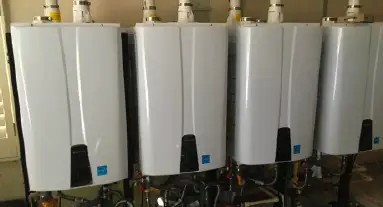
Reliable hot water matters. We handle installation, repair, replacement, and maintenance for both tank and tankless water heaters.
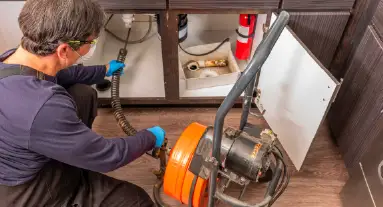
We'll identify plumbing issues with advanced video technology, then clear clogs to maintain free-flowing pipes.

Safe, efficient gas line service is our specialty. We offer installation, repair, and replacement for gas lines in homes and commercial properties.
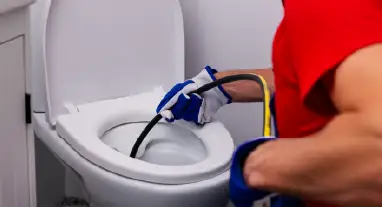
We offer high-pressure jetting service to eliminate stubborn buildups and restore proper flow to your plumbing system.
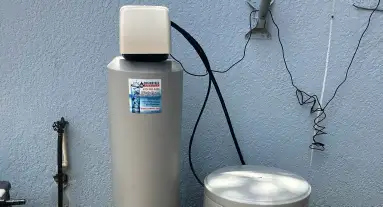
We offer water filtration solutions featuring Nelson systems for cleaner, healthier water throughout your home.

We handle slab leak detection and repair to stop hidden leaks beneath concrete and protect your property.
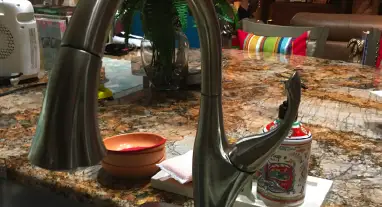
We handle fixture installation and repair to enhance functionality and aesthetics throughout your home.
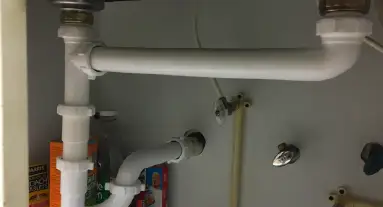
We handle general plumbing repairs, from leaks and broken pipes to other common plumbing issues.
COMMERCIAL PLUMBING IN THE GREATER BRANDON, FL AREA
For commercial clients, we offer water heater services, including tank and tankless systems, drain and pipe cleaning to keep plumbing running smoothly, and fixture installations for upgraded, efficient restrooms.
We provide commercial water heating solutions with efficient tank and tankless systems built to handle high-demand environments.
Learn MoreWe provide drain and pipe cleaning services to maintain peak performance and reliability in commercial plumbing systems.
Learn MoreWe handle commercial fixture installations, including sinks, faucets, toilets, and more, to keep your business restrooms functional and up to code.
Learn MoreEXPERT SOLUTIONS FOR WATER HEATERS, DRAINS, AND GAS LINES
When it comes to essential plumbing systems in Brandon, FL, Drainworks Plumbing & Gas Inc. delivers dependable service you can trust. From water heater solutions to drain cleaning and gas line work, our licensed professionals handle it all with skill, safety, and efficiency. Whether you're upgrading your equipment, troubleshooting an issue, or planning for long-term reliability, we offer expert guidance and quality workmanship every step of the way.
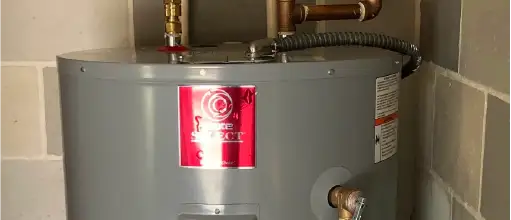
A reliable water heater is essential for any home or business. We offer installation, replacement, repair, and maintenance for:
Our tankless water heater solutions provide endless hot water while saving energy and space. We specialize in premium Rinnai and Navien systems, offering expert installation, maintenance, and repairs to ensure optimal performance and longevity.
Benefits include on-demand hot water, lower utility bills, compact design, and longer lifespan compared to traditional tanks.
We provide quality State brand tank water heaters for reliable hot water supply. Our services include professional installation, regular maintenance to prevent sediment buildup, and prompt repairs to address any issues that arise.
Traditional tanks are cost-effective upfront and ideal for homes with high simultaneous hot water demands.
Not sure which option is right for you? Our specialists can help you choose the best water heating solution for your property.
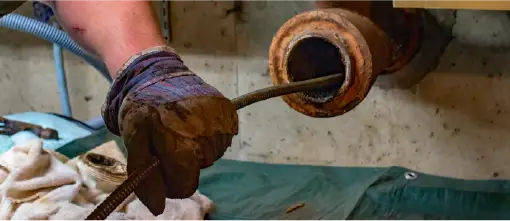
Clogged drains can lead to serious plumbing issues if not addressed promptly. Our Brandon, FL drain cleaning experts provide:
Our professional drain snaking service quickly removes minor blockages in sinks, tubs, and shower drains. This effective technique uses a specialized tool to break up and remove clogs without damaging your pipes.
For stubborn clogs, our high-pressure water jetting service thoroughly cleans pipes by removing buildup, grease, and debris that traditional methods can't handle. This comprehensive solution restores full flow capacity to your drains.
We use state-of-the-art camera technology to identify root intrusion, pipe damage, and blockages in your sewer lines. This diagnostic approach allows us to pinpoint issues without disruptive digging.
For damaged or collapsed sewer lines, we provide expert repair and replacement services. Our team uses efficient techniques to restore your sewer system with minimal disruption to your property.
Don't wait for a small clog to become a major issue – call Drainworks Plumbing & Gas Inc. for fast, effective solutions.
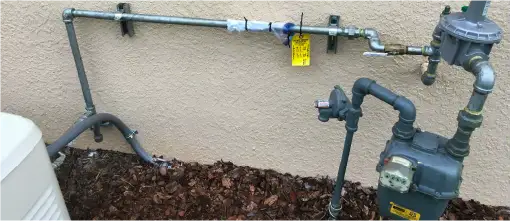
At Drainworks Plumbing & Gas, we specialize in safe and efficient gas line services for residential and commercial properties. Our services include:
We install new gas lines for stoves, fireplaces, outdoor kitchens, and more. Our licensed technicians ensure proper sizing, connections, and pressure testing to deliver safe, reliable gas service to all your appliances.
Our experts use specialized equipment to detect gas leaks and provide immediate repairs. We prioritize safety through comprehensive testing and quality materials to ensure your home remains protected.
We provide professional connection services for gas dryers, stoves, and water heaters. Our technicians ensure proper fittings and secure connections for safe appliance operation.
Looking to switch to more efficient natural gas? We help you convert from electric or propane to natural gas systems, handling all necessary piping, connections, and safety measures.
For professional gas line services in Brandon, FL, trust our licensed experts.
At Drainworks Plumbing & Gas Inc., we're proud to support those who serve our community and country. As a token of our appreciation, we offer special discounts to military personnel, first responders, and educators.
Request Service



OUR REVIEWS
Watch for signs like unusual water stains on walls or ceilings, reduced water pressure, slow drains, unusual odors from drains, higher water bills, or the sound of running water when fixtures aren't in use. These typically indicate plumbing issues that require professional attention. If you notice any of these warning signs, contact Drainworks Plumbing & Gas Inc. for an inspection.
Hidden plumbing leaks often reveal themselves through unexplained increases in water bills, the sound of running water when fixtures aren't being used, damp or warped flooring, mold or mildew growth, warm spots on floors (for slab leaks), or water stains on walls and ceilings. If you suspect a hidden leak, professional detection services can locate and repair the problem before it causes extensive damage.
Hydro jetting is a powerful drain cleaning method that uses high-pressure water to clear stubborn clogs,tree roots, and other debris from pipes. You might need hydro jetting if you experience recurring clogs, slow drains that don't respond to traditional snaking, or older pipes with years of buildup. It's particularly effective for commercial properties and homes with extensive drainage systems.
For most residential properties, annual professional drain cleaning is recommended as preventative maintenance. However, homes with large families, older plumbing systems, or lots of trees near sewer lines may benefit from more frequent cleanings every 6-8 months. Regular maintenance can prevent major clogs, backups, and costly emergency services.
A running toilet typically indicates an issue with the flapper, fill valve, or flush valve within the tank. You can try adjusting or replacing the flapper, checking the chain length, or adjusting the fill valve. If these simple fixes don't resolve the issue, or if you're uncomfortable working with toilet components, our professional plumbers can quickly diagnose and fix the problem to prevent water waste and increased utility bills.
Signs that your water heater needs attention include inconsistent water temperatures, insufficient hot water, strange noises (popping or banging), rusty or discolored water, leaking around the unit, or a water heater that's more than 10-15 years old. If you notice any of these issues, contact us for a professional inspection to determine if repairs or replacement are necessary.
Tankless water heaters offer several benefits including endless hot water, longer lifespans (15-20 years vs. 8-12 for traditional tanks), energy efficiency, and space savings. They're ideal for homes with limited space or families with high hot water demand. While initial installation costs are higher, the long-term energy savings and longer service life often make them a worthwhile investment. Our specialists can assess your specific needs and help determine if tankless is right for your home.
With proper maintenance, traditional tank water heaters typically last 8-12 years. Factors affecting lifespan include water quality (especially hard water), usage volume, maintenance frequency, and the quality of the original unit. Annual maintenance that includes flushing the tank can extend its service life by removing sediment buildup that contributes to tank deterioration. If your water heater is approaching or beyond 10 years, it's wise to start planning for replacement.
Water quality can be improved through several methods depending on your specific issues. Water softeners help with hard water that causes scale buildup. Whole-home filtration systems remove sediment, chlorine, and contaminants from all water entering your home. Reverse osmosis systems provide the highest quality drinking water at specific taps. We offer water testing and can recommend the best solution based on your water quality concerns and budget.
Yes, we specialize in gas line installations for outdoor kitchens, grills, fire pits, and other outdoor amenities. Our licensed technicians can extend your existing gas service to accommodate outdoor living spaces, ensuring safe, code-compliant installations with proper sizing, connections, and pressure testing. We handle everything from the connection to your home's gas supply through to the final connection of your outdoor appliances.
While simple fixture replacements (like swapping a faucet or showerhead) can be DIY projects for handy homeowners, more complex installations involving new water lines, drain modifications, or gas connections should be handled by licensed professionals. Improper installation can lead to leaks, water damage, code violations, and even safety hazards. Professional installation ensures proper function, prevents future problems, and maintains warranty coverage for your new fixtures.
Plumbing maintenance plans provide regular professional inspections to catch small issues before they become major problems. Benefits include priority scheduling for service calls, discounts on repairs and services, extended warranties on work performed, routine maintenance like water heater flushes and drain cleanings, and peace of mind knowing your plumbing system is being monitored by professionals. Regular maintenance can extend the life of your plumbing fixtures and prevent costly emergency repairs.
Absolutely. All of our plumbers are fully licensed, bonded, and insured in accordance with Florida state requirements. We maintain comprehensive liability insurance and workers' compensation coverage to protect both our customers and employees. Our team undergoes regular training to stay current with the latest plumbing technologies, techniques, and code requirements. We're happy to provide proof of licensing and insurance upon request for your peace of mind.
© Drainworks Plumbing & Gas Inc. 2025 | All Rights Reserved
Website by Red Barn Media Group